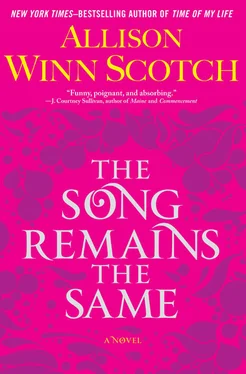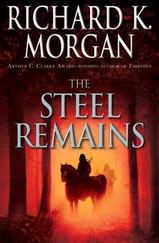Anderson greets us at touchdown, and a security officer stewards us through the intestines of the airport—the back hallways, the poorly lit corridors, toward the exit. I’m begrudgingly in a wheelchair, accepting Dr. Macht’s advice not to push myself, to be kind to my body, to trust what it can do for me when it’s ready to do it for me.
“There’s more press here for you than there were for me,” Anderson says, a sly smile awash his still movie-star-handsome face, his recovery complete in the few weeks since I’ve seen him. “I’d be jealous if I weren’t trying hard not to care.” He laughs. “My ego is the one thing that hasn’t been dented in all of this.” I laugh, too, and we agree that it is so good to see each other, like a homecoming of sorts.
We’ve already put a plan in place: that Peter will go out and make a statement on my behalf. The flight has exhausted me, and besides, I’ve promised Jamie his American Profiles exclusive. The security guard steers Peter left, and we break off like a wishbone toward the right. Anderson presses the doors open to the outside, and my mom wheels me into the blinding sun high in the New York sky. The early August humidity swaddles me—a warm embrace when I’ve spent too much of the past four weeks indoors in a hospital with its reminder that death is never too far away—and I inhale deeply, gloriously. Unexpected relief when I’d been dreading this unknown and what it could bring. Yes, it was wise to listen to my mother, to swim past the stream I would have chosen and let her guide me to something new.
I glance over my shoulder at her now, in her turquoise muumuu and loose gold earrings, and then at Anderson whose face has mostly healed and doesn’t betray a single scar of what we’ve been through. He is skinnier now, though, his cheekbones like knives.
I’m home, I think, and I might actually be okay.
Of course—and I can only know this later, know this with hindsight that time can bring—therein lies the problem with forgetting everything: you don’t remember that trouble is always just around the bend.
“Running on Empty”
—Jackson Browne
O ur apartment is nothing like the one I’d seen on Friends. I know it’s ridiculous, but I can’t help but be just a little disappointed. There are no vaulted ceilings, no quirky knickknacks, no sweeping balcony or expansive living room in which to host gathered pals for board game night.
“Well, here we are,” Peter says, my suitcase landing with a thud beside him. “I hope it’s, er, what you were expecting. You had a say in most of it.”
“It’s good, it’s great,” I answer, shuffling into the (tiny!) living room that wouldn’t even make up one quarter of Monica and Rachel’s. I leave the wheelchair in the hallway—I don’t, even symbolically, want to bring it over the threshold. That promise of the new me !
“I, um, decorated this?”
“Mostly.” He goes into the kitchen, which isn’t much of a kitchen, more of an abutting space off the living room with a few sad-looking appliances. I can see him through the pass-through in the wall. He’s nervous—I don’t know him well anymore, but I can tell that much. He fidgets around the kitchen, opening the refrigerator, closing it, opening a cabinet, closing that, too, finally settling on a giant plastic container of mixed nuts left out on the counter. He pushes them through the open-aired square toward me.
“Hungry?”
I shake my head and circle the space, the rubber of my sneakers squeaking along the wood flooring.
“It’s strange. This place doesn’t much feel like me. Like, this rug?” I run my toe back and forth over the worn, though beautiful, Oriental pattern atop the wood. “This rug doesn’t feel like me at all.”
“Your mom gave that to us. It was from one of your dad’s studios back in the day.”
Upon hearing this, I ease myself down, slowly, running my fingers over the tapestry, like maybe I’ll intuit something, hear— what? —the guidance of my father telling me who I am? What happened to him? Why he is no longer family? I’ve asked my mother twice for an explanation of not only why he left but why she intimated that he died (“You misunderstood, dear! I only said that he was gone!”), but I can see how much it pains her to discuss it, and besides, she says, it is only one dark cloud in our history—there are so many brighter ones. Let’s leave it for another time. So I do. Jamie’s lead at American Profiles, though, is making calls, and he assures me every time I ask—which is often—that we’ll know more soon.
I stand as sharply as my body allows—it’s weary from a month of mostly nonuse, and my hip emits an angry crack. “Ow, shit!”
Peter is next to me like lightning. “Here, sit, sit. ” He guides me to a faded, plush golden couch that seems better suited for a Victorian old-age home.
“Erg, I’m okay. I just forgot for a second.”
He grins. “Well, for more than just a second.”
It takes me a moment to realize what he means.
“Touché.” I smile.
“Well, that’s a good thing, that you were able to forget about it.”
We fall silent.
“This is weird,” I say finally.
He laughs so violently, tiny shards of cashews spray onto the gilded sofa.
“I’m sorry!” He bats a hand in front of his face. “I’m nervous…I don’t know why.”
“Me, too,” I say, even though I’m not so much, but it seems to put him at ease. He has told me that he knows I am risking everything by taking a chance on him again, and I have thanked him for this acknowledgment, for realizing that there is work, tangible work, to be done on both our parts. That, even with my amnesia, I can’t just pretend to forget. Or remember.
“That painting right there.” I point to the one over the mantel, an abstract that is big and boisterous with red and gold concentric circles, and also sad and bleak with stark shards of black cutting through, evoking how the sun might look on its last day, right before it exploded and decimated the earth and its population. “My dad’s?”
“It was your favorite. The only one we have.”
“Just one?”
“Just that one,” he says.
“Huh,” I say finally, turning away. I look around and notice that the white walls are either bare or covered in black-and-white photographs. A bulletin board next to the kitchen pass-through is pocked with Post-its, small pieces of itemized papers, receipts, but it’s an organized chaos, meticulous almost. Where’s the bright blue wall from Friends ? Where’s the joy? Where’s the color? Where is the sectional that we all sink into after a shitty day at the office and nurse our cheap wine on?
I slide onto the couch, running my fingers over the faded fabric. “Please tell me this couch was also a hand-me-down from my mom.”
He laughs. “No, this couch was all you. I hated it. But you saw it at the flea market and insisted.”
“It’s sort of awful.” I push myself to stand, and he steadies me, both of us staring down at the monstrosity. “I can’t believe I insisted.”
“We’d just moved in together, and you were trying on your sea legs. I don’t know. You wanted ‘funky-chic,’ or something like that. I think it was a direct reaction to some fight you and Rory were in.”
“About what?”
“God, I don’t know, but the general nature of your fights seemed to be about your finding her irresponsible and her finding you tightly wound. So you got annoyed with her, tried to prove her wrong, and we ended up with this.” He raises his eyebrows.
Читать дальше












